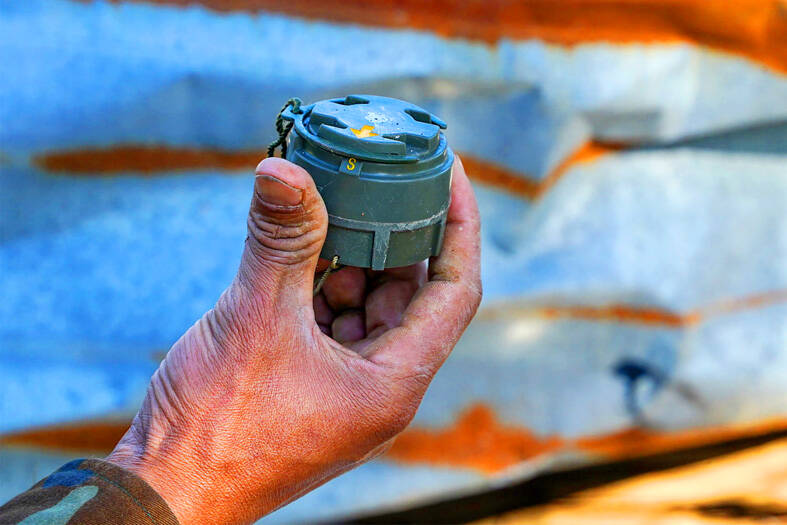Landmines and unexploded munitions claimed more victims in Myanmar than in any other country last year, a monitor said yesterday, warning the true toll could be double or triple its estimate of 1,000 people killed or wounded.
Decades of sporadic conflict between the military and ethnic rebel groups have left the Southeast Asian country littered with deadly landmines and munitions.
However, the military’s ouster of then-Burmese state councilor Aung San Suu Kyi’s government in 2021 has turbocharged conflict in the country and birthed dozens of newer “People’s Defence Forces” (PDFs) now battling to topple the military. Anti-personnel mines and explosive remnants of war killed or wounded 1,003 people in Myanmar last year, the International Campaign to Ban Landmines (ICBL) said.

Photo: AFP
There were 933 landmine casualties in Syria, 651 in Afghanistan and 580 in Ukraine, it said in its latest Landmine Monitor report.
With conflict and other restrictions in Myanmar making ground surveys impossible, the true casualty figure was likely far higher than reported, the ICBL’s Yeshua Moser-Puangsuwan said.
“How many more? Double? Triple? Quite possibly... There’s no medical surveillance system in the country that can provide official data in any manner or form,” he told a news conference in Bangkok.
“No armed group in Myanmar, not the military, not any of the ethnic armed groups, not the PDFs have provided us with any data on the number of casualties they have,” he said. “And we know from anecdotal evidence that it’s massive.”
Myanmar is not a signatory to the UN convention that prohibits the use, stockpiling or development of anti-personnel mines.
The ICBL said there has been a “significant increase” of anti-personnel mines use by the military over the past few years, including around infrastructure like mobile phone towers and energy pipelines.
Such infrastructure is often targeted by opponents of the military.
Myanmar’s military has been repeatedly accused of atrocities and war crimes during decades of internal conflict.
The ICBL said it had seen evidence of junta troops forcing civilians to walk in front of its units to “clear” mine-affected areas.
It said it had reviewed photos that indicated supplies of anti-personnel mines manufactured by Myanmar were captured by the military’s opponents every month from January 2022 and September “in virtually every part of the country.”
More than 3 million people have been displaced in Myanmar by the post-coup conflict, according to the UN.
All sides in the fighting were using landmines “indiscriminately,” the UN children’s agency said in April.
Rebel groups have said they also lay mines in some areas under their control.
The ICBL said at least 5,757 people had been casualties of landmines and explosive remnants of war across the world last year, 1,983 of whom were killed.
Civilians made up 84 percent of all recorded casualties, it said.
Last year’s figures are considerably higher than 2022, when the ICBL recorded at least 4,710 casualties, including 1,661 fatalities.

VAGUE: The criteria of the amnesty remain unclear, but it would cover political violence from 1999 to today, and those convicted of murder or drug trafficking would not qualify Venezuelan Acting President Delcy Rodriguez on Friday announced an amnesty bill that could lead to the release of hundreds of prisoners, including opposition leaders, journalists and human rights activists detained for political reasons. The measure had long been sought by the US-backed opposition. It is the latest concession Rodriguez has made since taking the reins of the country on Jan. 3 after the brazen seizure of then-Venezuelan president Nicolas Maduro. Rodriguez told a gathering of justices, magistrates, ministers, military brass and other government leaders that the ruling party-controlled Venezuelan National Assembly would take up the bill with urgency. Rodriguez also announced the shutdown

Civil society leaders and members of a left-wing coalition yesterday filed impeachment complaints against Philippine Vice President Sara Duterte, restarting a process sidelined by the Supreme Court last year. Both cases accuse Duterte of misusing public funds during her term as education secretary, while one revives allegations that she threatened to assassinate former ally Philippine President Ferdinand Marcos Jr. The filings come on the same day that a committee in the House of Representatives was to begin hearings into impeachment complaints against Marcos, accused of corruption tied to a spiraling scandal over bogus flood control projects. Under the constitution, an impeachment by the

Exiled Tibetans began a unique global election yesterday for a government representing a homeland many have never seen, as part of a democratic exercise voters say carries great weight. From red-robed Buddhist monks in the snowy Himalayas, to political exiles in megacities across South Asia, to refugees in Australia, Europe and North America, voting takes place in 27 countries — but not China. “Elections ... show that the struggle for Tibet’s freedom and independence continues from generation to generation,” said candidate Gyaltsen Chokye, 33, who is based in the Indian hill-town of Dharamsala, headquarters of the government-in-exile, the Central Tibetan Administration (CTA). It

A Virginia man having an affair with the family’s Brazilian au pair on Monday was found guilty of murdering his wife and another man that prosecutors say was lured to the house as a fall guy. Brendan Banfield, a former Internal Revenue Service law enforcement officer, told police he came across Joseph Ryan attacking his wife, Christine Banfield, with a knife on the morning of Feb. 24, 2023. He shot Ryan and then Juliana Magalhaes, the au pair, shot him, too, but officials argued in court that the story was too good to be true, telling jurors that Brendan Banfield set